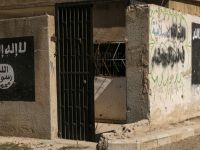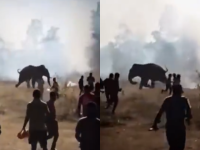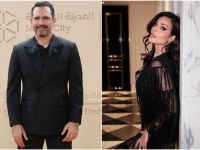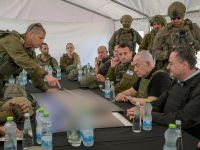Participating in the Arab Music Festival, the Palestinian group Sabreen, and their lead singer, the brilliant Kamilia Jubran, performed a concert last week at the Egyptian Opera House.
The first song Sabreen performed, Al Ahram Weekly said, was from their debut album Dukhan Al Barakin (Smoke of the Volcanoes).
Its lyrics -in classical Arabic- are from the Palestinian resistance poetry by Mahmoud Darwish, Samih Al Qassem and others, and set to music by Sabreen's founder, composer Said Murad.
The album was released in the early 1980s, the times of tremendous upheaval in the Arab World, of the Israeli invasion of Lebanon, of the Sabra and Shatila massacres. The reverberations throughout the Arab World are sharply echoed here.
Jubran’s voice carries all the conflicting, heart-wrenching emotions that are at the heart of being human, not just being Palestinian, said the weekly. It is a cry for a better life. Her voice is so beautiful it hurts.
Despite the classical content and message, the style - even since the days of Dukhan Al Barakin- remains unclassical. That's what they want: modern music that is also Arab, Arab music that is also modern.
"We try to reach a harmony of sorts between these very different sounds. We try to open up to different musical experiences. So a lot of our music reflects a dialogue between jazz and Arab music. Even the way we approach traditional Arab instruments is different. The way we play the oud, for example, getting new rhythms out of it," Kamilya Jubran told Al Ahram Weekly.
This was evident in the song On Man: "They put chains on his mouth.. They tied his hands to the rock of the dead.. And said: You are a murderer… They took his food, clothes and banners.. And they threw him in the prison cell of the dead.. And said: You are a thief… They threw him out of all refuges.. They took his young sweetheart.. And said: You a refugee… You whose eyes and wrists bleed.. The night will not last.. The detention room will not last.. Or the pain of the chains
Nero died and Rome did not die.. With its eyes it fights..."
Their second album Mawt Al Nabi (Death of the Prophet), came immediately before the first Intifada. "There was a feeling that many people were dying, many human experiences were dying. We were in direct confrontation with the occupation and it was a period of internal revolution. This provoked introspection on our part," Jubran said.
And Sabreen turned inside, to local colloquial Palestinian poets like Subhi Zubeidi and Hussein Al Barghouti. The lyrics deal with everyday affairs, with a lot of irony and sarcasm, a criticism of the spirit of submission that prevailed among some sectors of Palestinian society. Which is when the jazz really started coming through.
In contrast to the first two albums, the third Jayy Al Hamam (Here Come the Doves) was released in 1994, in the post-Intifada and Oslo peace process spirit. "The doves were coming, and then the doves died. They've shot them," she muses, with a wry sense of irony.
In Ala Fein (Where To?), their fourth and latest album, released last year, Sabreen are once more responding to the Palestinian predicament of the day. "We've tried resistance, we've tried confrontation, we've tried Intifada, we've tried peace. What else is left to us? And now where to?" Jubran explained.
Now what? is the question. In this album the subjects they've dealt with have broadened, and they seem to be moving out of the sometimes limited Palestinian niche into the wider Arab scene. The album contains lyrics by Egyptian poet Sayed Hegab and Lebanese poet Talal Haydar. But their underlining statement remains the same, explains Jubran, "just by making music under occupation, you are making politics, even if you don't say that," she reflects. "We still have the same human message, our new songs are variations on the same theme. We are looking for a better life -just as everyone else. We still haven't lived. We're still looking forward to something else."
It is very difficult making art, indeed making any living, under occupation. The group have to do everything from A to Z because of the lack of supporting networks and infrastructure. "You have to be very stubborn and to believe in your message, to insist to do something that is practically impossible. We live in chaos now,” she said bluntly, "it is just not safe. How can one sing in a concert when one doesn't feel safe enough to stand on stage?”
According to Jerusalem Media and Communication Center, Sabreen, which is one of the pioneering Palestinian music bands, featured a number of musicians and music teachers, who held other regular jobs. It is only in the past few years that the group has turned professional with full time musicians. Even though the musicians have changed over the years, the two constant members of the band who have come to give the band its character are Said Murad, composer, oud player, and artistic director, and Kamilia Jubran, main soloist and qanoun player – Albawaba.com
© 2001 Al Bawaba (www.albawaba.com)







